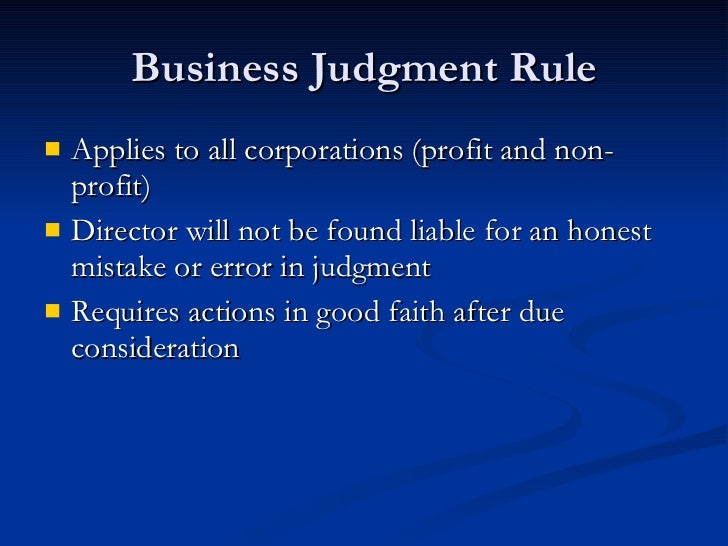Why Business Judgement Rule
Why Business Judgement Rule. The business judgment rule can protect directors and other company leaders from facing personal liability from certain actions taken and certain decisions that have been made in the course of company operations. The business judgment rule may be the most enigmatic doctrine in corporate law, but it has always performed a relatively straightforward task in the corporate governance system of the united states, namely, protecting corporate directors from liability for honest mistakes.

This post breaks down the rule into its main points so it is easier to digest. A corporate decision carries a presumption of due care; The business judgment rule can protect directors and other company leaders from facing personal liability from certain actions taken and certain decisions that have been made in the course of company operations.
1985) Although Unsolicited Tender Offers Pose Some Very Important Issues (For Example, The Government's Proper Regulatory Role), This Report Focuses On The Responsibility Of A Board Of Directors And The Issues To Be.
A corporate decision carries a presumption of due care; This includes exercising due care and having a business justification for their decisions and actions. The business judgment rule recognises the:
This Is Where The Business Judgment Rule, Introduced By The Companies Act 71 Of 2008 (“The Act”) Comes In, And It Serves As Protection For Directors Which Allows Them To Make Informed Decisions Without The Fear Of Liability.
It will go through the structure of the rule, as well as famous examples and new modifications of it. Planning for and responding to unsolicited tender offers. Directors of a corporation have a fiduciary duty to act in the best interest of their stockholders.
To Provide A Better Explanation Of Why This Is So, This Article Takes The Approach That The Aronson Formulation Of The Rule Is Not The Proper Starting Place.
The rule presumes that when making business decisions, those in charge have “acted on an informed basis, in good faith and in the honest belief that the action was in the best interests of the company.” aronson v. Are clothed with [the] presumption, which the law accords to them, of being [motivated] in their conduct by a bona fide regard for the interests of the corporation whose. Business judgement rule (bjr) is a presumption that directors, by default, act while (1) sufficiently informed, in (2) good faith, and with (3) an honest belief that they have the best interest of the corporation and stockholders in mind.
Bentley Professor Of Law At Washington & Lee University School Of Law.
By lyman johnson july 10, 2013. Committee on corporate laws, 41 (1): The duty of care requires directors and officers to act in as competent a manner as would reasonably prudent people in their positions.[1]
If A Resident Is Unhappy With A Decision Made By The Board And Was To Sue The Association, The Business Judgment Rule Defense Can Assist The Board To Prove That They Had Acted In Good Faith When Making The Decision, In Seeking The Court To Rule In Their Favor.
The words that courts use to convey that simple. The business judgment rule can protect directors and other company leaders from facing personal liability from certain actions taken and certain decisions that have been made in the course of company operations. And potential consequences of breaching duties as a director (i.e.
Post a Comment for "Why Business Judgement Rule"